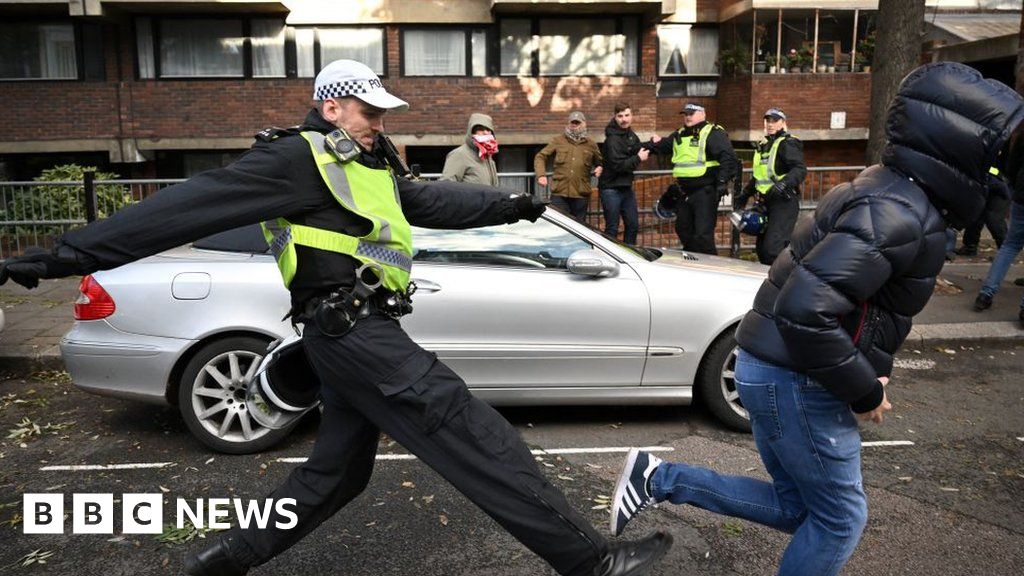- By Thomas Mackintosh
- BBC News
Watch: Missiles thrown as counter-protesters in police stand-off
The Met Police has condemned “extreme violence from right-wing protesters” who it says set out to confront Saturday’s pro-Palestinian march.
Nine officers were injured and 126 people arrested – the “vast majority” of whom were counter-protesters.
Police added while the march itself did not see such physical violence, serious offences relating to antisemitic hate crimes were being investigated.
The PM said those involved in crimes must face the full force of the law.
Rishi Sunak said: “I condemn the violent, wholly unacceptable scenes we have seen today from the EDL (English Defence League) and associated groups and Hamas sympathisers attending the National March for Palestine.
“The despicable actions of a minority of people undermine those who have chosen to express their views peacefully.”
He added that “EDL thugs attacking police and trespassing on the Cenotaph” war memorial had disrespected the honour of the UK’s armed forces.
It was the biggest UK rally since the war between Israel and Hamas began on 7 October.
In a statement on Saturday, Assistant Commissioner Matt Twist said the march had taken place in “unique circumstances”, against a backdrop of conflict in the Middle East, remembrance events and a “week of intense debate” about protest and policing, which “all combined to increase community tensions”.
Writing in the Sunday Telegraph, Labour leader Sir Keir Starmer accused her of “demeaning her office”, adding that “few people in public life” had recently done more to “whip up division”.
But former cabinet minister Nadine Dorries disagreed, telling the BBC’s Laura Kuenssberg she believed any woman who reached high office faced a backlash “steeped in both misogyny and sexism”.
Downing Street said Mr Sunak still had “full confidence” in the home secretary.
Image source, Getty Images
Assistant Commissioner Twist said the violence directed towards officers on Saturday was “extraordinary and deeply concerning”, with nine injured after counter-protesters clashed with police along Whitehall and in Chinatown.
“They arrived early, stating they were there to protect monuments, but some were already intoxicated, aggressive and clearly looking for confrontation,” he said.
Officers protecting the Cenotaph faced abuse and chants of ‘you’re not English any more’.
Many in these groups, who were “largely football hooligans from across the UK”, were stopped and searched, with weapons including a knife, baton and knuckleduster found, as well as class A drugs.
Most arrests were made to “prevent a breach of the peace”.
The assistant commissioner continued that while the pro-Palestinian march “did not see the sort of physical violence carried out by the right wing”, it was clear that for Jewish communities “the impact of hate crime and in particular anti-Semitic offences is just as significant”.
He said “a number of serious offences identified in relation to hate crime and possible support for proscribed organisations” during the protest were being investigated.
Police issued five photos of six individuals suspected of hate crimes.
One shows a woman carrying a placard on which the Jewish symbol, the star of David, is shown to incorporate a Swastika.
Watch: Michael Gove surrounded by pro-Palestinian protesters shouting ‘shame on you’
Elsewhere, footage shared on social media showed Michael Gove ushered through London’s Victoria Station by police officers, as crowds waving Palestinian flags shouted: “Shame on you.”
A source close to the levelling up secretary said he had been returning from his constituency and was taken away in a police van.
During the protests, BBC News was given rare access to the Met Police’s control room in south London, which includes thousands of cameras.
One live feed from a police helicopter was powerful enough to show a man sitting in a pub window and how much he had left in his drink.
Watch: 300,000 demonstrators in London demand ceasefire
On the pro-Palestinian march, chants of “free Palestine” and “ceasefire now” could be heard as crowds began marching from London’s Hyde Park.
At one point the march, organised by the Palestine Solidarity Campaign, extended from the Hilton Hotel in Park Lane to the US Embassy in Nine Elms – a distance of roughly 2.5 miles.
One demonstrator told BBC News: “We want a ceasefire. People are suffering, children are dying under the rubble, and no-one seems to care about them.”
Another protester said: “I think it is the perfect day to actually do it on. Because that’s what Armistice is, it is a call for ceasefire and a call for stopping war.”
No major protest is scheduled to take place on Remembrance Sunday, although the policing operation will continue with some 1,375 officers deployed amid commemoration events in the capital.

William Turner is a seasoned U.K. correspondent with a deep understanding of domestic affairs. With a passion for British politics and culture, he provides insightful analysis and comprehensive coverage of events within the United Kingdom.








